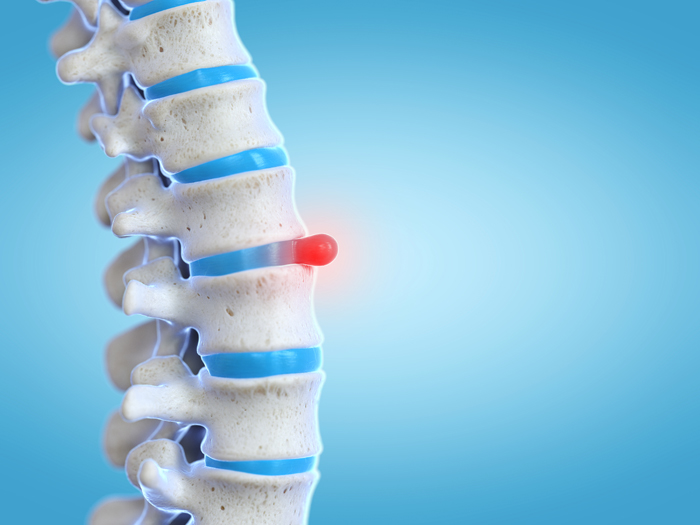Vertebral Disc Prolapse Surgery in Koramangala, Bangalore
A herniated disk is a condition characterized by a slipped disk in your vertebrae. It is also known as vertebral disk prolapse. The problem is usually with one of the disks that sit between the vertebrae to cushion each part of the spine.
Also called a slipped or ruptured disk, a herniated disk can irritate the nerves surrounding it resulting in pain, tingling or numbness in another part of your body. You can seek vertebral disk prolapse treatment in Bangalore.

What do you need to know about a vertebral disk prolapse?
Your vertebral column consists of many disks. Each spinal disk has a nucleus (a jellylike substance) encapsulated by the annulus (a tough, rubbery exterior). A vertebral disk prolapse occurs when the nucleus falls out through holes in the annulus.
What are the symptoms of a herniated disk?
This condition primarily occurs in the lower back or neck. Symptoms of a disk prolapse depend on the location of the disk and if the disk is pressing on a nerve. If you experience any of the following symptoms, consult one of the vertebral disk prolapse doctors in Bangalore:
- Pain: If the prolapse occurs in your lower back, you can feel pain in your thighs, calves and glutes. You may also experience pain in your foot. If the prolapse is in your neck, the pain will be focused on your arms and shoulders. Pain in one part of your body might shoot to another point when pressure is applied. This includes situations in which you cough, sneeze or move quickly.
- Numbness and tingling: If the prolapsed disk presses on to the surrounding nerves, it can disrupt the signal carried by the nerves. This can sometimes result in a lack of feeling or numbness in an area.
- Weakness: When the nerve-muscle communication is disrupted by a slipped disk, the muscle served by the nerves begins to weaken. This can result in a lack of balance, stumbling and an inability to lift or hold objects.
What are the causes of a vertebral disk prolapse?
A vertebral disk prolapse is caused by the wear and tear of a disk in a process called disk degeneration. In most cases, it is caused by:
- Too much pressure
- Trauma in the back
- Genetics
When do you need to seek a doctor?
If you have neck or back pain that reaches your arms or legs, visit a doctor to find out if you are affected by a vertebral disk collapse. Seek medical attention if you also have numbness, tingling, and/or weakness.
You can request an appointment at Apollo Spectra Hospitals, Koramangala, Bangalore.
Call 1860 500 2244 to book an appointment.
What are the risk factors?
These include:
- Smoking
- Obesity
- Physically demanding jobs
- A family history of the condition
How do you manage the prolapse pain?
Pain caused by a slipped disk can be minimized by applying one or more of these methods:
- Exercise: In the past, people with back pain associated with this condition were advised to rest. However, this method has been proven wrong after a while as resting increased the risk of developing chronic back pain. General exercise is widely recommended for patients. Strengthening your muscles can help support the spine better and relieve you of pain. Seek advice from a physiotherapist regarding the type of exercises that are suitable for your condition.
- Physical treatments: Some people opt for a chiropractor or an osteopath for pain relief. They provide short-term comfort, but the pain is likely to return after a session.
- Medication: You can choose to take painkillers. Some of the effective painkillers are:
- Anti-inflammatory painkillers: Ibuprofen, diclofenac and naproxen. Use anti-inflammatory drugs only when the pain is very bad. Try to avoid them as much as possible as they are bad for your health. People with high blood pressure, kidney problems and cardiac issues must stay away from these drugs
- Weak opioid medicines accompanied by paracetamol
- Amitriptyline
- Epidural: An epidural is a drug containing steroids and an anesthetic. It is directly injected into your spine as a long-term painkiller.
- Surgery: If the pain is extremely severe and unmanageable for a prolonged period of time, doctors suggest surgery. The procedure involves removal of a portion of the prolapsed disk to release the pressure on the nerves.
Conclusion
The right amount of exercise combined with occasional medication can get rid of your pain and help you live as normal a life as possible. Vertebral disk prolapse can also be prevented by maintaining a healthy weight and staying away from physical work that may exert too much pressure on your back. For further assistance, you can visit vertebral disk prolapse hospitals in Koramangala.
You can prevent this condition by exercising well, maintaining a healthy weight, having a good posture and avoiding tobacco.
Pain due to a herniated disk can occur in your buttocks, thighs and calves. The pain usually comes and goes. It peaks when you are active and subsides when you rest.
Follow these steps if you have a slipped disk:
- Lie on your back and turn to one side.
- Bring your knees to your chest and slowly curl your torso.
- Periodically shift sides to avoid imbalances.
Symptoms
Our Doctors
DR. MURALIDHAR T S
MBBS, MD (Anaesthesi...
| Experience | : | 25 Yeras Experience |
|---|---|---|
| Speciality | : | Pain Management... | Location | : | Koramangala |
| Timings | : | Available by prior a... |
DR. SHRUTI BACHALLI
MBBS, MD (Anaesthesi...
| Experience | : | 16 Yeras Experience |
|---|---|---|
| Speciality | : | Pain Management... | Location | : | Koramangala |
| Timings | : | Available by prior a... |
Our Top Specialities
NOTICE BOARD
CONTACT US
CONTACT US
 Book Appointment
Book Appointment




.svg)
.svg)
.svg)
.svg)








